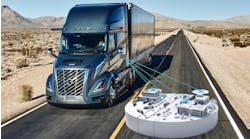I've have been involved in this industry since I was a teenager. My first job was in a gas station in my home town of Minneapolis.
I've been a "gear-head" ever since I can remember. We all were in my age group.
The popular bands of the day wrote songs about cars, and every kid's dream was to own a car that he could spend weekends repairing and making go faster. If you had a cool car, you dated the hottest girls.
I was 16 years and a week old when a really great guy, Len Olson, hired me to work in his Mobil station. It was great. It was a very busy job, and Len and his head mechanic went out of their way to train and teach all of the young people that worked there how to service and repair cars and trucks.
WATCHFUL EYES
That is the way things worked in the days of black and white TV. The experienced technicians trained the newbies.
Before six months were up, I could run diagnostic equipment on cars, pinpoint problems and repair them reasonably well, always under Len's watchful eye and helpful nature.
By the time I was 17 and a junior in high school and I could diagnose and repair most problems as well as a car dealership technician.
It seemed like every day Len and his older workers would take one of us "pump-jockeys" under their wing and teach us something new.
THE OLD WAY
Eventually, Len sold his Mobil station to Jerry Gilkeson. He had also been trained the same way as me and my friends, only on heavy trucks at a local International Trucks dealer.
Jerry was a walking book of knowledge, and probably one of the best problem solvers I ever knew. He would explain that all vehicles are made up of interacting mechanical parts, and by employing logic you would always move toward the proper diagnosis.
He was the first person to ever use the phrase, "It ain't rocket science," with me, and it really wasn't, at least back then.
CONTINUAL CHALLENGES
The cold Minnesota weather brought new challenges with repairing vehicles. It was very common in those days for weather to stay below -15 degrees F for 10 to 15 days at a stretch, sometimes hitting 30 or 35 degrees F below 0.
With such conditions came more learning at the side of one of the senior guys or the new owner, Jerry. Nothing acted the same on a vehicle when it was -15 degrees or colder, especially if the block heater wasn't plugged in.
There have been plenty of new challenges to overcome and learn for the future, especially with all the technological changes that have been occurring.
When electronics showed up, first in ignition systems and then transmissions, the world changed big time.
If you were going to work on Chrysler, Ford or GM cars, you needed to pay for training at the Chrysler, Ford or GM training center. You had to buy a lot of new types of tools and manuals.
TECHNOLOGY TRANSITIONS
At this time, I was in high school playing sports and did not have the time to take the classes at the various OEM training centers. So, I started selling tires, and PM service, as technology changes rapidly, fazed me out of the vehicle repair market.
A similar transition has been taking place with HD vehicle technology. It was always fairly complex, but diesel technicians were able to stay on top of most of the changes by reading manuals and training each other.
In less than a decade, diesels and the trucks they power became as technologically advanced as passenger cars, which already required years of training to work on as a technician.
Electronics appeared on transmissions, brakes, lighting systems, exhaust, engine accessories and all imaginable areas. Basic mechanical systems stayed relatively the same, but electronic systems that controlled them became nearly impassable barriers for the typical HD diesel technician.
REDUCED TRAINING
Diagnostic tools, special hand tools and the use of a computer to do any kind of troubleshooting became the norm. OEMs were cranking out new innovations at such a rate that dealership technicians were taking weekly training, sometimes for days and weeks at a time.
Independent shops had a choice to try to hire away the dealership talent or send their technicians to OEM training. Unfortunately, that last part doesn't exist in most areas.
Dealership training budgets for diesel technicians are equal to, and in some cases, surpass the total gross sales of most competing independent shops. Dealerships invest significant amounts of money on technician training and to buy diagnostic tools and systems.
Independent shops can still repair many of the mechanical systems, but often cannot complete jobs without taking the truck to a dealership to reset the system controls.
WIDE RIFT
A real rift has emerged over this particular problem.
Independent shops typically work on vehicles that are out of warranty and provide broader geographic coverage to truck owners, with many shops using mobile service. Without the training and diagnostic tools, none of that does much good.
Some shops are able to work out arrangements with dealers to allow them to finish jobs, but the key here is the word "independent," and many repair shops and truck dealerships are very independent. Most would never consider consorting with their perceived enemy.
GOVERNMENT INTERVENTION
Unfortunately, this has become such an impasse that some in the industry are looking to legislation at the state and federal levels to require the sharing of diagnostic tools and information, plus allow access to the specialty tools and equipment to complete customer work.
There are currently several state and federal pieces of legislation, and even a ballot initiative, regarding the "Right to Repair" by independents.
I'm not sure where that will lead, other than to generate a lot of wealth for the legal profession, should those laws and initiatives ever reach a final state.
My purpose in writing this memory lane analogy is to note that we can't go back to how things were 40 years go. Lines have been drawn and it doesn't look like there will be any simple resolution.
Enacting laws requiring businesses to share intellectual and proprietary property seems to be a strategy not well considered.
I am not a fan of government intervention in the private sector. It always creates unintended consequences.
It would be great if the parties could come together and try to work through a template of some sort that would provide an industry solution for all.
World history is filled with accounts of entities snatching defeat from the jaws of victory.
The simplest solution is to not go to war over things of this nature. Talk, however painful, is always better.




